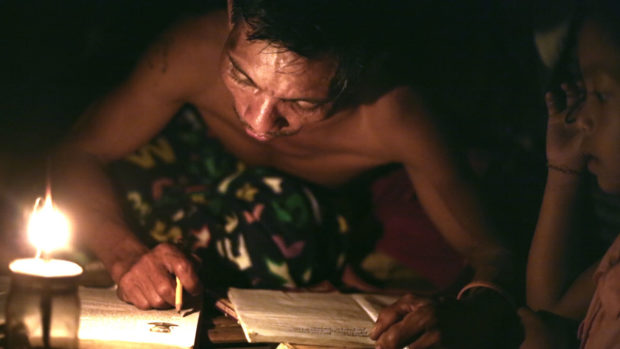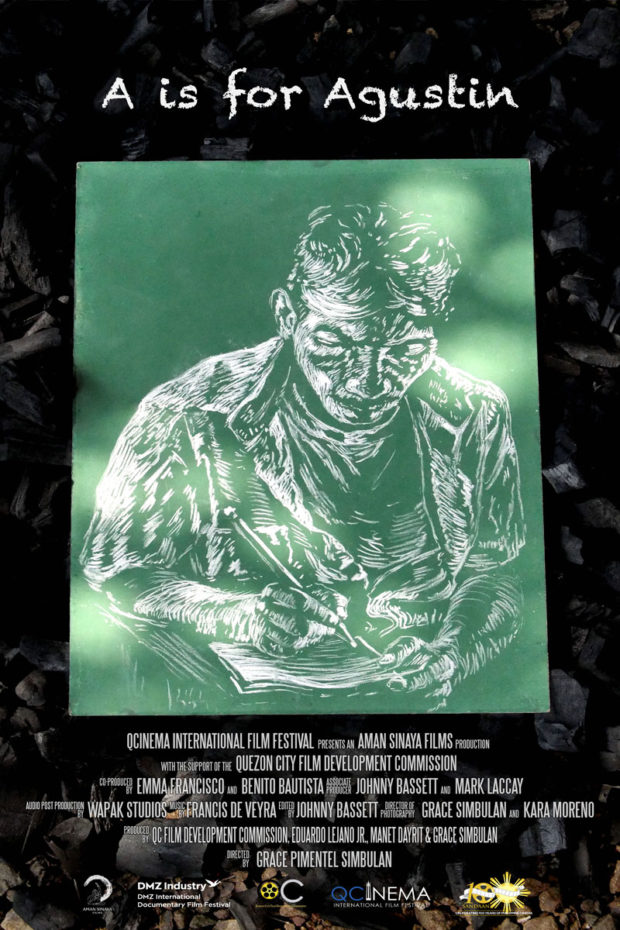
A scene from Grace Simbulan’s “A Is for Agustin.” CONTRIBUTED
“A is for Agustin” tells the story of a poor Filipino in a small barrio in Zambales who gets tired of being cheated by his employer who takes advantage of the fact that he could neither read nor write. So Agustin Tiburcio makes a critical decision: he goes back to school — even though he’s nearly 40.
Now, that may sound like some trite movie plot for some corny dramedy starring some movie star given to shallow, mindless antics.
But “A is for Agustin” tells a real-life story. What makes this quiet, powerful documentary unique and compelling is the way it takes you into the world of Agustin Tiburcio, an Aeta in his late 30s, who makes charcoal for a living, loves to sing, and works hard to provide for his family in Cabangan, Zambales,
There is no narration. The story is told cinema verite-style through real-life scenes featuring Agustin Tiburcio, his family, his neighbors, his teacher, his classmates.
We watch key chapters of Agustin’s life unfold in the film.
We meet him at the beginning while he’s rehearsing for a local singing contest, which he wins. We see him again gathering charcoal for his employer. And we see him talking with a friend who tells him that his employer is actually selling each sack for charcoal for way more money that he is getting paid.
“Our boss told us it’s only P150 a sack, but it’s actually P250,” Agustin tells his wife. “I never want to work here again.”
Occasionally, we hear Agustin’s reflections on his situation as we watch him go about his day to day struggles.
“It’s so hard to be uneducated,” he says, as he and his family are taking the bus to town. “People take advantage of you to your face. Lolokohin kang harap-harapan ng mga tao. … I told my mother I want to learn. But my mother said, ‘You’re almost 40. You’re already old.’”
But Agustin Tiburcio decides that an education is the only way out for him and his family. And the film takes us with him on his exciting journey through elementary school.
We see him in a classroom with children who are his classmates, learning the sounds of letters in the alphabet. We see his teacher correcting the way he spells his name. The teacher, a woman who looks to be in her 30s, is patient and respectful and calls him “kuya,” older brother.
We see his classmates helping him out with a reading assignment. We see him in front of their classroom blackboard trying to solve a math problem. We see him in the evening in his shack, reading with the aid of a kerosene lamp, together with one of his daughters who has become one of his schoolmates.
His plan appears to be working. Agustin seems to be fulfilling his goal, his dream of gaining an education so he would no longer be exploited by others, so he could finally build a more prosperous life for his family. You find yourself rooting for Agustin Tiburcio, even though you know he likely faces an uphill climb.
And sure enough, challenges emerge.
Agustin still had to earn a living for his family, which makes it harder to focus on schoolwork. He continues to struggle with his lessons, and falls behind. And he turns to alcohol to ease the mounting pressure. He ends up dropping out.
There is no dramatic climax to his story. The film ends quietly, which makes it even more powerful in my view.
In one of the final scenes, we see Agustin showing his report card to his daughter. “Here’s my report card. The grades are bad, aren’t they?”
The shot lingers on Agustin’s face, pensive, sad, calmly accepting that he is failing in his goal. The next scene shows him writing with kerosene lamp for light. We hear his voice: “I dream of going to high school but the brains of today’s youth like the sun they generate a lot of heat. And mine, has nothing. It’s nothing. Guess you can say it’s like the sun setting, sinking.”
Let me pause here for an important disclosure: the filmmaker is my niece, Grace Pimentel Simbulan. This is her first major work, which took a lot of time, effort, and commitment.
She spent a few weeks at a time in Agustin’s barrio, with him and his family, building a relationship with them to tell their story.
It took her eight years to finish the film.
It would have been much easier to use a voice-over narration to tell Agustin’s story. But that would have been a weaker film. Instead, Grace chose to let the story unfold through the scenes in Agustin’s life, through his words and the words of his family and community.

Filmmaker Grace Simbulan. CONTRIBUTED
Because she is my sister’s daughter, activism informs her filmmaking. Her mother, Nymia Pimentel Simbulan, and her late father, Alfred Simbulan, spent their youth fighting tyranny as part of the underground resistance against the Marcos dictatorship. My sister was imprisoned twice.
“Fighting takes on many forms and for my parents’ generation, they saw that going underground was the more powerful way they could bring about change,” she told me. “For me, since I’m in an age where the use of multimedia and social media has become a powerful tool, my hope is that by focusing on Agustin’s story and his community, I can shed light on the plight of their community.”
In fact, Grace had worked on another film that an Aeta chieftain told her had helped put an end to mining operations in their area.
With Agustin’s story, Grace also didn’t just shoot and then leave. She has shown the documentary to Agustin and his community twice. “The first time was overwhelming,” she told me. “Medyo sad kasi nakita niya ulit lahat ng nangyari sa kanya (A bit sad because he revisited everything that had happened to him).”
Grace returned the following week and asked his permission to show it to the tribal elders as well. There was more discussion about the film and the issues it raised. It became more of a community event.
Agustin and the Aeta chief will get to watch the film again and on a big screen at the gala screening on October 16 at Gateway Cinema 2.
Visit the A is for Agustin page on Facebook.


